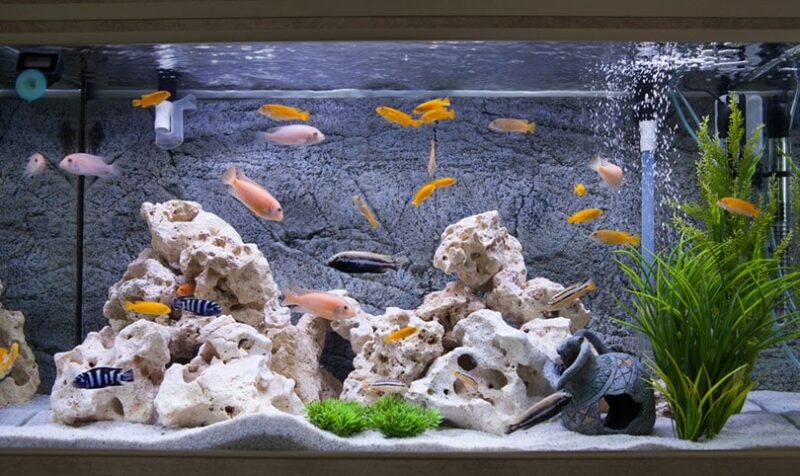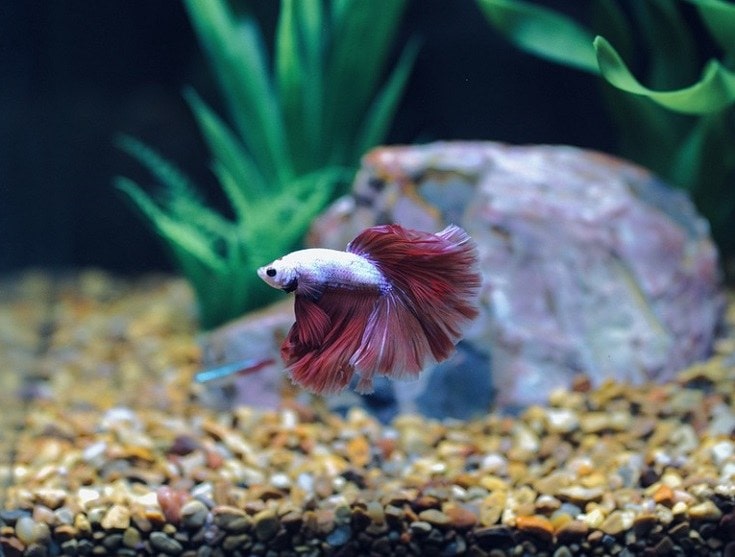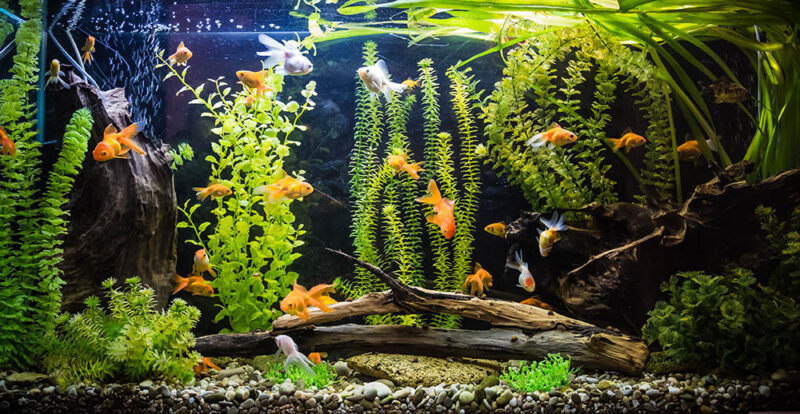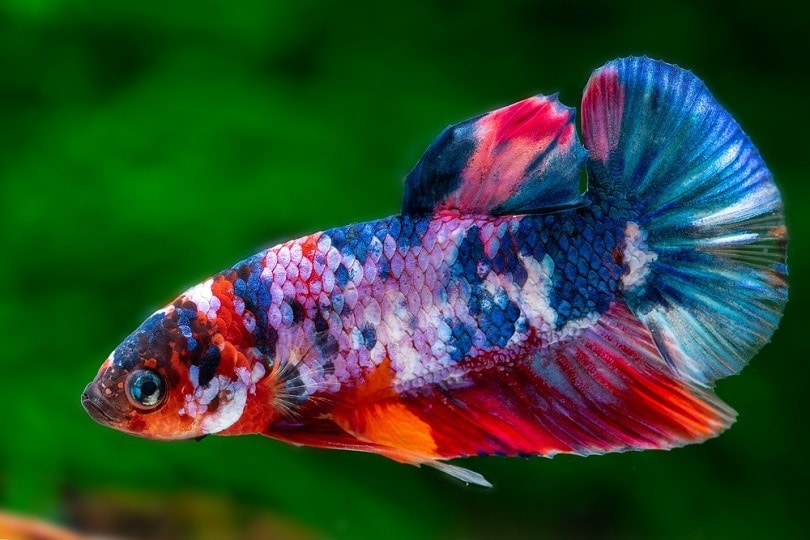
Betta fish are one of the most popular freshwater fish commonly kept as pets in the aquarium hobby. With the betta being so popular, there have been many different myths and misconceptions surrounding this fascinating fish. Betta fish are usually placed in a small bowl and left to survive, but with updated information and plenty of research from experts, we now know that many misconceptions about bettas are not allowing this fish to thrive.
Before getting a betta fish, it is always recommended to do as much research as possible, but you will come across misinformation that may be troubling to decipher whether it is true or not. That is why we have created this article—to debunk some of the most common myths and misconceptions about betta fish that are still believed today.
 Top 7 Betta Fish Myths and Misconceptions
Top 7 Betta Fish Myths and Misconceptions
1. Betta Fish Don’t Need Heaters or Filters
Like all fish, bettas require a filter and since they are tropical fish, they require a heater. The first essential items that you should add to your betta’s new aquarium are a heater and filtration system.
The ongoing misconception that bettas do not need a heater or filter stemmed from when people kept them in small bowls which could not fit these items. Since bettas are tropical fish, you will need to place an adjustable heater inside to keep the temperature stable – their true temperature preference is 82.5 °F (28 °C), however, they can adjust to temperatures ranging between 75.2 – 86 °F (24 – 30°C). The heater helps to keep their water at a desirable temperature and prevents your betta from becoming chilled when the room temperature starts to drop.
In order to ensure the temperature in your betta’s aquarium remains consistent, it is important to house them in a room where the temperature is slightly colder than the heater setting – this way, the aquarium heater constantly ensures the temperature remains at a desired level. If the ambient temperature in the room exceeds the setting on the heater, it will not cool the water, but rather go on standby until the temperature drops below a certain threshold.
Bettas require filtration systems to create space for beneficial bacteria to grow, along with very gentle surface movement to prevent the water from becoming stagnant and dirty. You will want to make sure that the filter output is not so strong that it makes it difficult for your betta fish to swim. Sponge filters are the best for bettas, as they do not appreciate strong currents. Sponge filters also ensure that their tails or fins don’t snag or get caught in the filter’s intake.

2. Male Betta Fish Can Be Housed Together
Male betta fishes are territorial fish that will fight any fish that they view as a territorial threat; this includes other male bettas and other fish they may misconstrue as a betta. They will also not appreciate a non-breeding female in their territory.
The fighting usually begins when they are sexually mature, and there is little to no lifelong success rate in housing two male betta fish together. Males have been specifically bred for aggression in generations past, and tend to be more aggressive than their wild counterparts. Therefore, placing bettas together in the same tank is not a good idea for the health of your fish.
Even if your bettas aren’t fighting, they have been known to show signs of stress when housed together, and stress is often detrimental to pet fish.
Female betta fish have been known to get along in large groups with a heavily planted tank that is over 20 gallons in size, but even female betta fish can be territorial at times, especially when an individual in the hierarchy wishes to challenge a fish for a higher rank in their pecking order.
3. Betta Fish Fight To The Death
Another common misconception about betta fish is that they fight to the death. This is not true, as a physical confrontation presents a risk for both fish involved in the scuffle. Bettas prefer to warn potential threats with an action known as a flare, where they push their gills out and fan open their fins to appear larger and more intimidating.
In the wild, flaring serves the purpose of avoiding conflict and allowing both fish to go their separate ways. As pets, being confined in a small space and being bred specifically for aggression has unfortunately exacerbated the fighting tendencies of these fish.
It is nonetheless important to know that intrinsically these fish aren’t always looking for a fight and will only do so if there’s no other option. Thankfully, the practice of forcing these fish to fight has largely fallen out of favor.
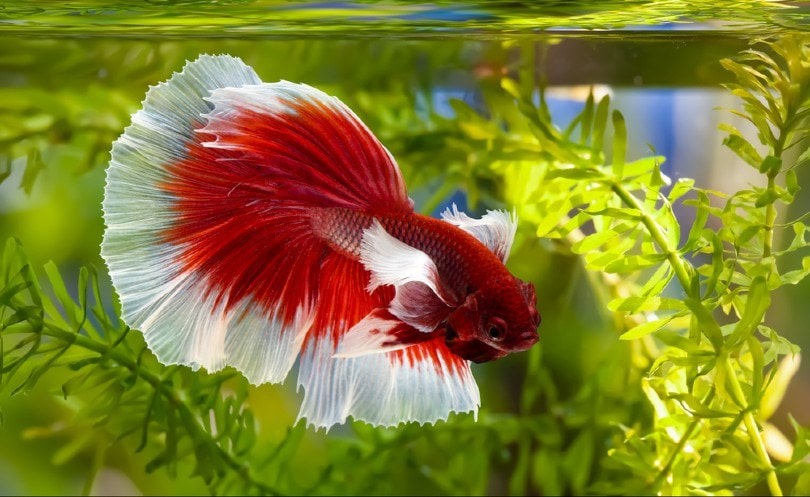
4. Betta Fish Only Evolved from Small Puddles
This myth is extremely common; however, it is not entirely true, and it is mainly used to justify poor living conditions for bettas. Betta fish inhabit warm tropical rice paddies, ponds, marshes, drain ditches, and other vegetation-rich bodies of water in the wild.
The misconception that bettas evolved from small puddles is partially true, however, it is not their ideal habitat. During certain times of the year, the betta fish’s habitat would dry up due to low rain and drought, which would leave the bettas in a small puddle that could only get filled during rain or flooding.
These small “puddles” caused bettas to evolve to survive this short dry season where they resulted in living in poor conditions. These puddles would not be large enough to support many bettas who had very limited territory per fish, leaving them to fight for space, succumb to injuries or stress, or even jump into nearby puddles where they could try to live instead.
Many bettas would likely die during this time, and the low oxygen in the water meant that the betta had to rely on their labyrinth organ to breathe properly. These small puddles were uncomfortable for the betta to live in, but some bettas had to endure these conditions unless they died first from starvation or toxin build-up from their waste.
5. Bettas Cannot Live with Other Fish
With bettas being so territorial, it is understandable for people to assume that bettas cannot tolerate any other species of fish very well. However, bettas can live with other compatible tropical fish. Some bettas can live with schooling fish like Harlequin rasboras or other friendly tetra species that do not have flowing fins.
When keeping bettas in a community setup, the primary concern is the safety of the betta, not the other fish in the aquarium. This is because bettas are slow, weak swimmers and don’t fare well against bullies. Even if they were to show an interest towards a tankmate, most fish swim too fast for a betta to catch them. Furthermore, tank mates that are in large schools have an added advantage of numbers – it would be very difficult for a betta to single out an individual to inspect more closely.

6. Betta Fish Do Better in Bowls and Small Tanks
Keeping betta fish in bowls, vases, or other small aquaria is still quite common, but it is not the ideal living environment for a betta fish. This is because most bowls and vases are way too small to house a betta fish comfortably, and they can rarely fit a filter and heater inside. Most bowls and vases are under the recommended 5 gallons for bettas, which means that it is not going to make a comfortable living environment for your betta fish. According to Dr. Krista Keller a board-certified specialist in zoological medicine, betta fish need more than just a bowl.
By providing your betta fish with a larger tank, they have more room to explore, exhibit their natural behaviors, and it also helps dilute the build-up of toxins from their waste. If your betta fish seems to do betta in a smaller body of water, it could be due to a few factors. Betta fish can be quite shy, so if they are in a larger tank, they will need plants to create shelter for themselves.
Heavy-finned bettas also need a low-flow filter that will not make it difficult for them to swim, along with leaves from plants to lie on when they get tired. Poor water quality from an uncycled tank can also cause your betta to act abnormally when moved to a different or larger aquarium.
7. Betta Fish Don’t Live Long
There’s a myth that betta fish only live for a couple of weeks or a month if they are lucky, but the true lifespan of a betta fish ranges from 3 to 5 years, with some living even longer. The lifespan of a betta fish depends on their genetics, care, and living conditions. Placing a betta fish in an uncycled tank or bowl with no proper enrichment and poor water quality will not allow your betta fish to live very long.
Most bettas kept in poor living conditions will die from water quality issues or diseases before they are even mature. With the right care, betta fish can live for several years.

Conclusion
Betta fish can make wonderful pets and by understanding your betta’s needs, you can have your betta fish living a long and healthy life by your side. With so many fin types, colors, and shapes, there are endless options of betta fish that you can add to your tank.
We hope that this article has helped debunk some common myths and misconceptions you might hear about betta fish, and that betta fish are more intelligent and conscious than we previously believed.
Featured Image Credit: Ron Kuenitz, Shutterstock


 Top 7 Betta Fish Myths and Misconceptions
Top 7 Betta Fish Myths and Misconceptions

